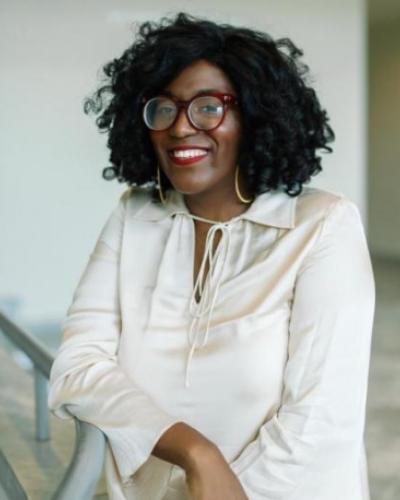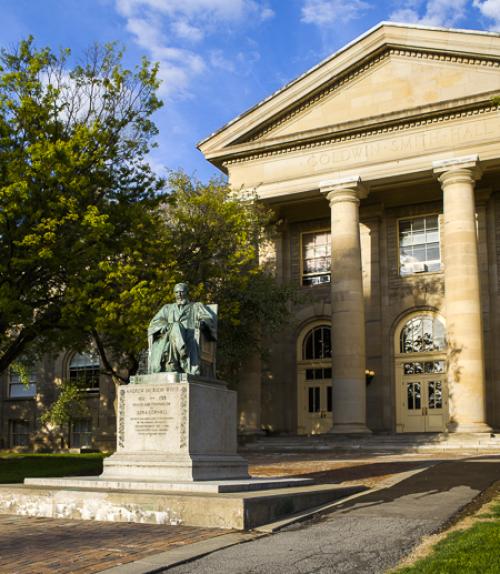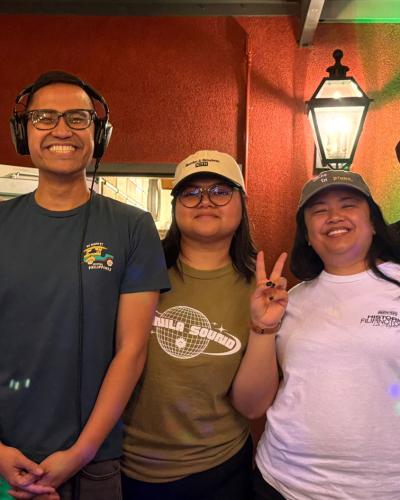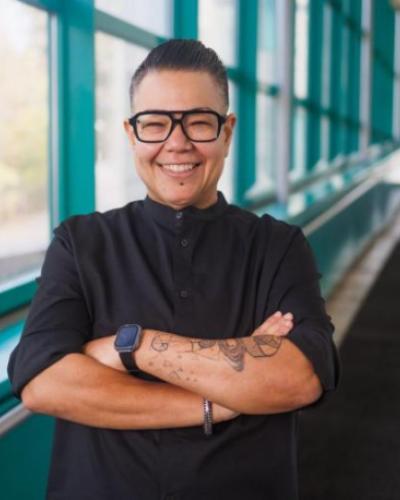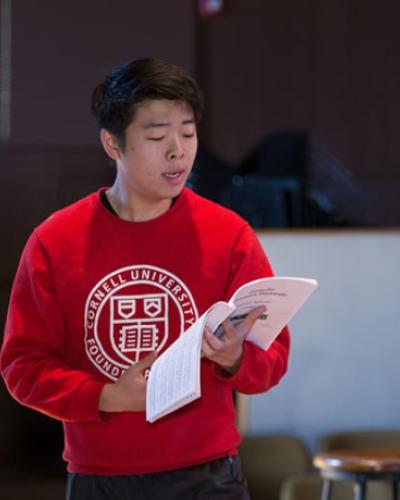Listed here are the new spring 2017 course offerings from the Department of . Course enrollment begins Tuesday, January 17.
The Expressive Voice (PMA 2830)
Instructor: Rebekah Maggor
Course Time: M/W 12:20 p.m.–2:15 p.m.
This course introduces students to the primary components of vocal technique in performance. Over the course of the semester, students will work through a series of vocal exercises that provide the basis for good vocal practice and mediated performance contexts. Additional details: Through a physical exploration of the actions of vocal production and speech, students will begin to develop the skills and flexibility necessary to assume a wide range of acting roles and other forms of performing and speaking in public.
(Embodied Performance rubric)
Global Dance II: A History of the Moving Body in Media and Performance (PMA 3227/ VISST 3227)
Instructor: Byron Suber
Course Time: T/Th 11:40 a.m.–12:55 p.m.
This course maintains a critical focus on the role of the moving body in a history of media and live performance. Following a series of conceptual rubrics rather than a linear historical chronology, students will develop a taxonomy of the body that can include such categories as: the emotional body, the dancing body, the crying body, the discursive body, the superhero body, the receptive body, the pedestrian body, the honey boo boo body, the digital body, the grotesque body, the naked body, the ideal body, the pathological body, the healthy body, the prosthetic body, the abstract body, the criminal body, and the pornographic body.
Film Production Design Studio: Designing the Next Batman Film (PMA 3641)
Instructor: Kent Goetz
Course Time: T/TH 12:20 p.m.–2:15 p.m.
Students will research, analyze and compare the design elements of architecture, interior design, costume, lighting, weaponry, technology, and popular culture within the various media presentations of "Batman" and relate the themes and aesthetics of those presentations to the social, political, and economic environment of the times in which they were created. Students will study and practice graphic communication and presentation skills in their particular design area of interest, culminating in a final design project that supports a particular film sequence for a select scene in a published, yet to be produced, screenplay for a Batman film.
(Design rubric)
Postcolonial Drama: Uncanny Figures, (Un)settled Spaces. (PMA 3806)
Instructor: Aoise Stratford
Course Time: T/TH 11:40 a.m.–12:55 p.m.
This class aims to introduce students to some of the key theories and critical questions of post colonialism and then explore these ideas in a range of plays from postcolonial cultures. The course offers an exciting range of plays that are stylistically and tonally rich and cover a variety of topics including the traffic of organ doning from India to the West, slavery in early colonial Canada, and gender, power, and miscegenation in the formative years of the Australian penal colony. Students will engage with the texts through discussion, close reading, written analysis, and creative assignments. We will examine how the (un)settled places and uncanny figures of postcolonial drama stage troubled histories. We will try to understand drama as stories, political inquiry and acts of resistance. And we'll explore how postcolonial plays function in relation to questions of gender, race, power and globalization that shape our theatre and our thinking today.
(History, Theory, and Criticism rubric)
Instructor: Dehanza Rogers
Course Time: M/W 7:30 p.m.–10:30 p.m.
Students crew together on a series of short exercises and projects using both film and digital cameras. The course explores principles and tools of lighting and camera techniques used in visual storytelling covering topics such as people, environment, spatial relationships, movement, color, and continuity.
(Creative Authorship rubric)
Prison Theatre: The Possibilities of Transformation (PMA 4680)
Instructor: Bruce Levitt
Course Time: F 5:15 p.m.–10:45 p.m., plus arranged discussion time
This multi-faceted course explores the cultural aspects of imprisonment through a focus on theatre produced by prisoners. The course responds to the circumstances of mass incarceration through the lens of those who work with the incarcerated to create performance pieces and stage plays in correctional facilities. There will be once-weekly discussion sessions to discuss texts and conduct sessions with those working in prisons. Students will also attend weekly lab sessions on Friday evenings with the Phoenix Players Theatre Group at Auburn Correctional facility. Because of travel time to and from Auburn, the lab hours are extensive.
(History, Theatre, and Criticism rubric)
Instructor: Karen Jaime
Course Time: T/TH 1:25 p.m.–2:40 p.m.
This graduate course explores nightlife as a temporality that fosters countercultural performances of the self, and that serves as a site for the emergence of alternative kinship networks. Focusing on queer communities of color, course participants will be asked to interrogate the ways in which nightlife demonstrates the queer world-making potential that exists beyond the normative 9-5 capitalist model of production. Performances of the everyday, alongside films, texts, and performance will be analyzed through a performance studies methodological lens. Through close readings and sustained cultural analysis, students will acquire a critical understanding of the potentiality of spaces, places, and geographies codified as "after hours" in the development of subcultures, alternative sexualities, and emerging performance practices.
(History, Theory, and Criticism rubric)

